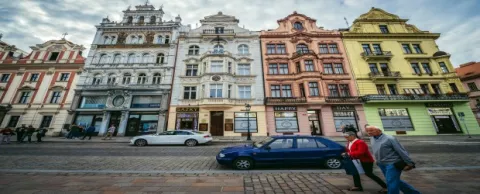
Pilsen comes in as the fourth largest city in the Czech Republic, with a population of nearly 170,000. The city sits strategically in the western part of the country, just 92 kilometres from Prague and 70 kilometres from the German border. While Pilsen’s claim to fame may be its world-renowned pilsner, the city is now becoming just as known for its green spaces, technological innovations and cutting-edge education as its beer, with five research university centres sitting right in town. By working with students and citizens to improve city services through the help of free Wi-Fi and mobile phone applications, Pilsen is proving to be a city that doesn’t rest on its laurels when it comes to developing modern solutions that will have a major impact. Let’s take a look at three ways, in particular, Pilsen is striving to become the no.1 smart city in the Czech Republic.- Philippe Léonard
Vision for smart city success
Pilsen is already the first city in the country to carry out aerial work in the field of unmanned aviation. In an effort to promote and develop the use of drones, the city launched DronFest, one of the largest unmanned flying festivals in the world, featuring competitions that encourage the design of mobile apps for drones. Pilsen has also partnered with students to bring their start-up dreams to reality, working on projects such as bike-sharing systems. Here are a few of the other key projects underway:
- Technical education: Through the Smart Edu Pilsen plan, the city aims to improve technical education by providing facilities for its primary and secondary schools, as well as new interactive technology. With 17 robotics centre activities, the program offers everything from teacher education to robotics teaching at elementary schools, preparing the next generation in this field so they can help the city further its smart solution developments in the future.
- IoT network: Pilsen set up its own sensor network, LoRa, a low rate data and low energy communication network that can transfer data from places lacking in connectivity options. With this Internet of Things-connected network, applications can monitor air quality and water levels in rivers, as well as allow municipal companies to track everything from occupied parking spaces to water and heat net metering.
- Digital services for citizens: In an effort to keep citizens connected, Pilsen offers free Wi-Fi in tourist destinations and city buildings. Citizens can also connect directly with the city through the Plznito (Pilsen it) app and report requests for areas that need troubleshooting, such as damaged benches or public lighting defects. Lastly, the Pilsen Card serves as everything from a prepaid travel pass and library card to an e-wallet where users can purchase tickets for city events.
Thanks to the development and support of these smart city solutions, Pilsen is transforming into a modern hub that continues to improve the quality of life for all generations, as well as offer the facilities needed to encourage the growth of the education system and its numerous technological innovations.



